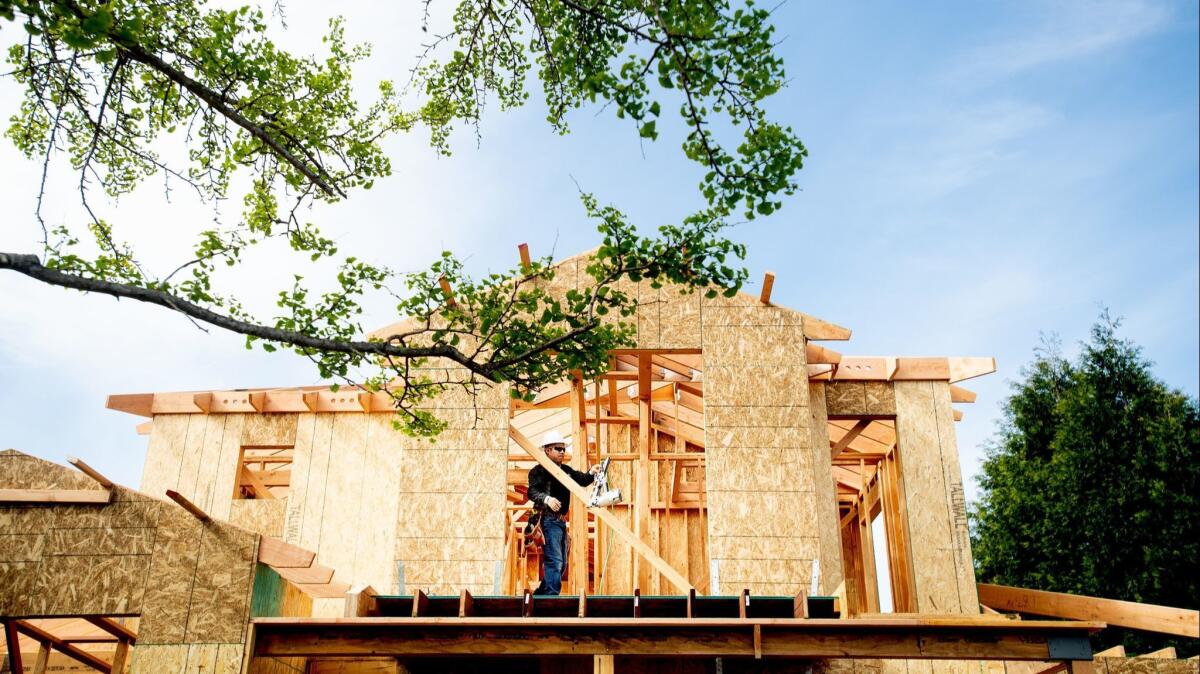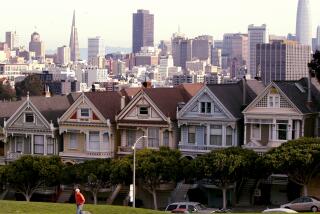California bill to add housing in single-family home neighborhoods blocked by lawmakers

Reporting from Sacramento ‚ÄĒ A high-profile bill that would have increased home building near mass transit and in single-family home neighborhoods across California has been killed for the year, ending a major battle over how to address the state‚Äôs housing affordability crisis that has attracted attention nationwide.
Senate Bill 50 by Sen. Scott Wiener (D-San Francisco) would have required cities to allow four- to five-story apartment complexes near rail stations and four or more homes on land zoned only for single-family homes across Los Angeles, San Francisco, Silicon Valley and much of the rest of California.
The measure would have radically altered the state’s growth patterns to direct significant new development toward urban areas, something the bill’s backers said was necessary to make housing more affordable and to meet the state’s goals to reduce greenhouse gas emissions.
But opponents of the legislation argued that changes under SB 50 would have unalterably diminished the quality of life in many California neighborhoods dominated by single-family home development. Others against the bill worried that its efforts to spur building would displace low-income residents already threatened by the state’s high housing costs.
Disputes over SB 50 revealed deep divisions among Democrats who dominate the Legislature over solutions to California’s longstanding housing affordability problems.
Median home prices in the state have reached $548,000, nearly 2¬Ĺ times the national average, according to real estate website Zillow. Nine and a half million renters ‚ÄĒ more than half of California‚Äôs tenant population ‚ÄĒ are burdened by high rents, spending at least 30% of their income on housing costs, according to a recent analysis by UC Berkeley‚Äôs Haas Institute for a Fair and Inclusive Society.
Lawmakers representing the state‚Äôs urban centers ‚ÄĒ predominantly from the Bay Area ‚ÄĒ were SB 50‚Äôs chief supporters, while legislators from suburban areas worked to narrow the bill and ultimately blocked it.
Sen. Anthony Portantino, a Democrat from La Canada Flintridge and chairman of the Senate Appropriations Committee, said he was against SB 50 because it would have trumped zoning rules that are almost exclusively under the control of cities and counties. Portantino announced that the bill had been shelved until 2020 at the beginning of the committee’s hearing Thursday morning.
Portantino said in an interview that he was especially concerned by provisions in the bill that would have increased density around busy bus routes, saying doing so would be out of scale with existing communities.
‚ÄúA lot of them go through residential neighborhoods,‚ÄĚ he said.
The demise of SB 50 marks the second time in two years that an effort from Wiener to increase home building near transit has been shelved without a vote on the floor in either house of the Legislature. But while the fate of Wiener’s bill last year was expected because of substantial opposition from labor unions, many low-income housing advocates and local governments, Thursday’s action was a surprise.
Though cities and counties remained opposed to Wiener’s efforts this year, the legislator secured backing from the powerful State Building & Construction Trades Council of California, the labor group representing construction workers. He was also in negotiations with tenant organizations over potential changes to the bill, and found additional new supporters including environmental and other labor groups that hadn’t weighed in last year.
Gov. Gavin Newsom also made addressing the state’s housing affordability crisis one of the centerpieces of his 2018 gubernatorial campaign, adding momentum to Wiener’s efforts. Newsom called for a building boom in the state, including the construction of 3.5 million new homes by 2025, a pace that would more than quadruple California’s current output.
Though Newsom did not take a position on SB 50, he said in a statement after the decision that he was ‚Äúdisappointed‚ÄĚ the bill was blocked.
‚ÄúDeveloping housing around transit must also be part of the solution, and today‚Äôs developments can‚Äôt end or stall that critical conversation,‚ÄĚ Newsom said.
The governor’s office did not respond to questions about whether he attempted to intervene to keep the bill alive, and Portantino declined comment on whether he had spoken with the governor about it.
There was no public vote blocking SB 50 on Thursday. Though lawmakers can shelve bills in appropriations committees without explaining how or why action was taken, making it unclear who killed the legislation, committee and legislative leaders are principal decision makers.
When asked if he made the decision to block the bill, Portantino responded: ‚ÄúI‚Äôm the chair of the committee.‚ÄĚ
Despite the action Thursday, Wiener said he has not given up on the bill advancing this year, but conceded that moving it forward would be very difficult.
‚ÄúWe‚Äôre not giving up trying to move it forward this year,‚ÄĚ Wiener said. ‚ÄúThis is not over.‚ÄĚ
The Legislature has complicated procedures that allow bills to be revived, but it would take extraordinary levels of support that would probably involve strong-arming by legislative leaders. Senate President Pro Tem Toni Atkins (D-San Diego) released a statement after the decision Thursday complimenting Wiener for his effort, and said the legislation would not be heard again until 2020. Atkins’ office did not respond to an interview request.
Even with the increased support that Wiener won this year, the bill faced a steep climb. Last month, he changed the legislation to reduce its impact in smaller counties, amendments made as concessions to Sen. Mike McGuire (D-Healdsburg), who represents Marin, Sonoma and other suburban and rural Northern California communities. McGuire said that smaller communities should not have to accommodate as much density as their larger counterparts.
Those changes turned McGuire into a supporter of SB 50, but many local government and neighborhood groups remained opposed, including city councils in Los Angeles and San Francisco.
Los Angeles City Councilman Paul Koretz, who represents part of the Westside, applauded the bill’s demise.
‚ÄúThis bill is intended to destroy single-family home neighborhoods in the state,‚ÄĚ he said in a statement. ‚ÄúI believe a majority of Californians do not share in that goal. We will be vigilant to fight SB 50 when it rears its ugly head again in 2020.‚ÄĚ
Had the bill advanced on Thursday, Wiener said he believed he had enough votes for the bill in the Senate to move it to the Assembly. But if he can’t revive SB 50 this year, he plans to try again in January.
‚ÄúWe‚Äôre either serious about solving this crisis, or we aren‚Äôt,‚ÄĚ he said. ‚ÄúAt some point, we will need to make the hard political choices necessary for California to have a bright housing future.‚ÄĚ
More to Read
Get the L.A. Times Politics newsletter
Deeply reported insights into legislation, politics and policy from Sacramento, Washington and beyond. In your inbox three times per week.
You may occasionally receive promotional content from the Los Angeles Times.











